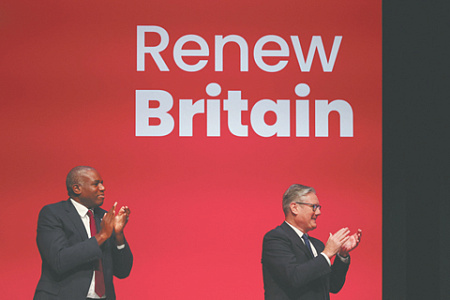
British Prime Minister Keir Starmer is battling for his political survival as his Labour Party’s annual conference kicks off in Liverpool. Facing a rebellion within his own ranks and the unprecedented rise of a far-right rival, Starmer is under immense pressure to restore confidence in his leadership and offer a clear vision for a country grappling with economic turmoil.
The four-day conference is a critical moment for the Prime Minister. He and his deputy, David Lammy, are set to present a “plan for change” designed to win back the trust of the British public. However, the event will also be a major test of Starmer’s ability to quell growing dissent and unite a party that appears to be on the verge of a schism.
Just over a year into his premiership, Starmer’s government has been overshadowed by the meteoric rise of the far-right party, Reform UK. Capitalizing on public anger over immigration and the cost-of-living crisis, issues the mainstream parties have struggled to address, Reform UK has surged to become the most popular political force in Britain, posing a direct and serious challenge to Labour’s hold on power.
Compounding the external threat is a severe internal crisis. A recent poll of Labour members revealed that a staggering 53% want a change in leadership, with only 31% backing the current prime minister. Furthermore, 64% rated Starmer’s performance negatively, and 65% believe the party is heading in the wrong direction. His authority has been further weakened by the recent loss of key allies, including his deputy Angela Rayner, who resigned over a tax scandal, and the UK ambassador to Washington, Peter Mandelson, whom Starmer fired over his association with the disgraced financier Jeffrey Epstein.
At the conference, Starmer intends to go on the offensive, framing the choice for Britain as one between his vision of “patriotic national renewal” and the “destructive division and decline” he argues Reform UK represents. It is a high-stakes attempt to regain control of the political narrative and present himself as the only credible leader for the nation.
However, the path forward is fraught with difficulty. Starmer must simultaneously act as a skilled negotiator to mend fences with his internal opponents and convince a skeptical nation that his government has a viable plan. His efforts are hampered by a grim economic reality, with persistently high inflation and a bleak outlook, making it incredibly challenging to compete with Reform UK’s simple, populist promises.
The fragility of his leadership was starkly illustrated in July when his own MPs blocked a government proposal to cut benefits, a measure the Prime Minister had deemed essential for managing the budget deficit. With his government’s ratings in freefall and a party deeply divided, failure to deliver a convincing performance at the conference could make the threat of his removal from office a stark reality.
